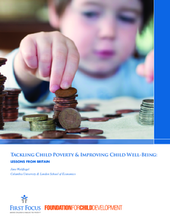In the United States, it is often thought that child poverty is an intractable problem. Clearly, the causes of child poverty are complex and multi-faceted, and there is no magic bullet that would eliminate poverty or its adverse effects. But there is evidence that policies that raise family incomes can lead to improved child and family well-being. There is also evidence that home visiting, early childhood, nutrition, and other social programs, particularly if they are high-quality, can lead to improved outcomes for poor children.
This paper describes recent efforts to reduce child poverty by a peer country, Britain. How did Britain manage to make such a substantial reduction in child poverty? What’s next for their anti-poverty initiative? And, what lessons can the US learn from their experience? Drawing on research carried out over the past decade, this paper summarizes what we know about Britain’s war on poverty, their likely next steps, and implications and lessons for the US.
©Columbia University & London School of Economics, First Focus, and Foundation for Child Development

